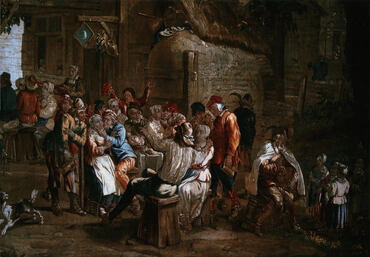Festa

Há dois tipos de banquetes mencionados na Bíblia. Algumas foram realizadas para comemorar eventos específicos e únicos, como a festa que Abraão realizou para celebrar o nascimento de Isaque. Outros são comandados pelo povo de Israel como eventos anuais ou repetidos.
Em geral, as festas únicas representam uma conjunção de dois estados espirituais. Somos chamados, por exemplo, a trazer nossas vidas externas - o que fazemos e pensamos no dia-a-dia - em conjunção com as crenças internas que temos no Senhor e seus desejos de bem para nós. Nos momentos em que conseguimos fazer isso, podemos experimentar uma sensação de alegria e plenitude que nos traz à mente uma festa.
As festas prescritas representam a alegria que podemos sentir na adoração ao Senhor - tanto em atos rituais de adoração quanto na adoração que oferecemos quando vivemos de acordo com Seus mandamentos.
Estes são significados adequados, tanto porque as festas são alegres e festivas como também devido ao significado espiritual do alimento e da bebida. O alimento representa o desejo de bem, que em última análise nos vem do Senhor. A bebida representa as verdadeiras idéias que nos ajudam a saber o que é bom e como agir sobre ela. Festejar implica adquirir grandes quantidades de ambos, o que é certamente uma coisa alegre.
(Odkazy: Arcanos Celestes 2341, 3832, 5161, 7093 [1-5], 7884, 9286, 9296, 10412)
Arcana Coelestia # 2341
2341. 'And he made a feast for them' means dwelling together. This is clear from the meaning of 'a feast'. 'Feasts' are mentioned in various places in the Word, and in those places they mean in the internal sense dwelling together, as in Jeremiah,
The word of Jehovah came to him, You shall not go into the house of feasting to sit with them, to eat and to drink. Jeremiah 16:8.
In that chapter the prophet is told many things by which he was to represent the necessity for good to have no connection with evil, nor truth to have any with falsity. Among other things he was required 'not to go into the house of feasting', which meant that good and truth were not to dwell together with evil and falsity.
[2] In Isaiah,
Jehovah Zebaoth will make on this mountain a feast of fat things for all peoples, a feast of sweet wines, of fat things full of marrow, of wines well-refined. Isaiah 25:6.
Here 'mountain' stands for love to the Lord, 795, 1430. People with whom that love exists dwell together with the Lord in good and truth, which are meant by 'a feast'. 'Fat things' and those 'full of marrow' are goods, 353, 'sweet and well-refined wines' are truths deriving from goods, 1071.
[3] The feasts made from the consecrated elements when sacrifices were offered represented in the Jewish Church nothing else than the Lord's dwelling together with man within the holy things of love meant by sacrifices, 2187. The same was at a later time meant by the Holy Supper, which the Primitive Church called a feast.
[4] Chapter 21 below refers to Abraham making a great feast on the day that Isaac was weaned, in verse 8. This feast represented and therefore meant the dwelling together and initial conjunction of the Lord's Divine itself with His Human Rational. 'Feasts' have the same meaning in the internal sense in other places, as may also be deduced from the fact that feasts are occasions involving a number of people who are all simultaneously filled with love and charity, who are opening their minds to one another, and who are enjoying together the glad feelings that are the expressions of love and charity.






